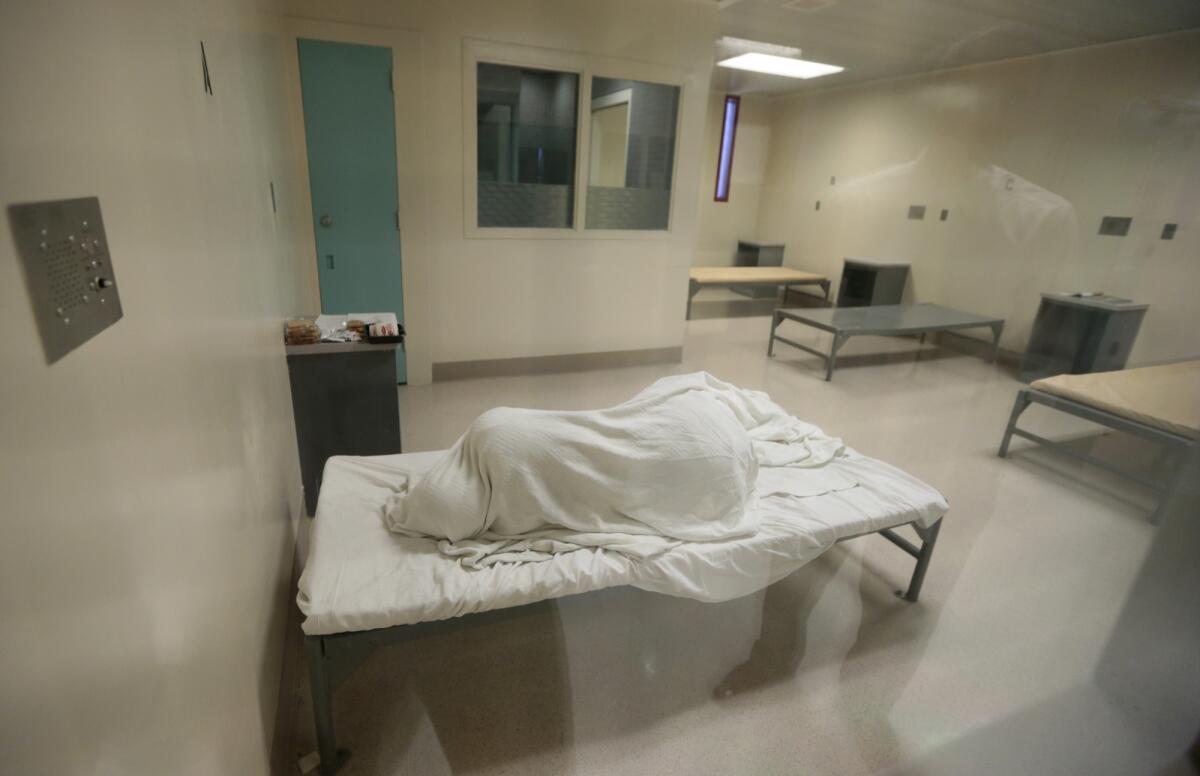Ex-inmates want L.A. County to stop dumping mentally ill inmates on skid row

An inmate sleeps in a room on the 4th floor of the medical unit of the Twin Towers Correctional Facility. This area houses inmates with the highest level of need - both psychiatric and medical.
- Share via
A group of former Los Angeles County jail inmates said Monday that a recent legal settlement between the Sheriff’s Department and federal authorities will perpetuate the cycle of people with untreated mental illness bouncing back and forth between jail and skid row.
The former inmates are seeking changes in the settlement that was reached this year as part of an effort to end abuse of inmates by sheriff’s deputies and to improve chronically poor treatment of mentally ill inmates.
The settlement requires the county to create a “discharge plan” for inmates with serious mental illness when they are released from jail, including giving them prescriptions for medication and referrals to community mental health treatment providers.
In documents filed in federal court Monday, the group of former inmates argued that the settlement excludes many people in need of help because the discharge plan requirement does not apply to inmates whose mental illness stems from a personality disorder, developmental disability, dementia or substance abuse.
The group also argued that simply handing inmates a list of referrals will be ineffective. The former inmates are being represented by Public Counsel and the law firm of Munger, Tolles and Olson.
Mark Rosenbaum, directing attorney of Public Counsel Opportunity Under Law, called the county’s referral lists a “meaningless gesture” for people who are mentally “incapable of deciphering such a list or navigating what must be done to receive services or medications.”
He said providing a list to such inmates is “like handing out lists written in hieroglyphics.”
Royal Williams, a 44-year-old homeless man, said in the court filing that he has “bipolar schizophrenia” and has been arrested multiple times, primarily on drug offenses. He said he had been released before with a list of referrals.
“There were maybe 50 places on the list, and I didn’t know which ones would be good for me,” he said, according to one of the court filings. “Mentally, I wasn’t in a place where I could figure out who to call or where to go. I threw the lists away.”
Noting that there is a limited amount of room at mental health treatment programs, the plaintiffs also argued that inmates might be sent on a “wild goose chase” through referrals to programs that are unable to help them.
Rosenbaum said jail staff should be required to verify that programs have the ability to take in new clients before referring inmates to them. If there are not enough programs to serve all the people coming out of jail, he said, more need to be created.
“To the extent that these services don’t exist ... common sense and the law tell us that these services need to be provided,” he said.
Sheriff’s spokeswoman Nicole Nishida said department officials had not yet seen the court filing and “will reserve comment on pending litigation.”
The Los Angeles County Board of Supervisors recently voted to set up an office of diversion in an effort to move at least 1,000 mentally ill offenders out of lockups by getting them into treatment programs and providing housing and other services.
At their meeting Tuesday, the supervisors will consider adding $50 million to the budget of a program intended to prevent homelessness.
For more county jail news, follow @sewella and @cindychangLA.
More to Read
Sign up for Essential California
The most important California stories and recommendations in your inbox every morning.
You may occasionally receive promotional content from the Los Angeles Times.















